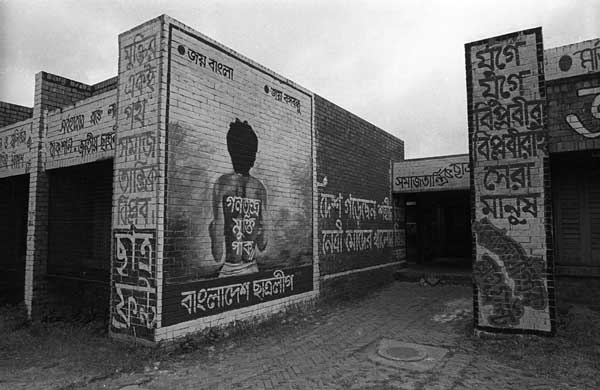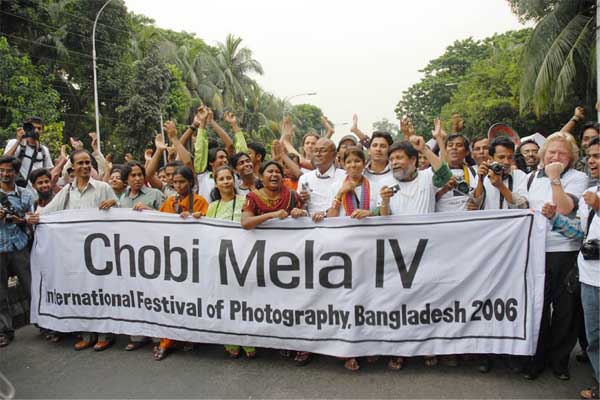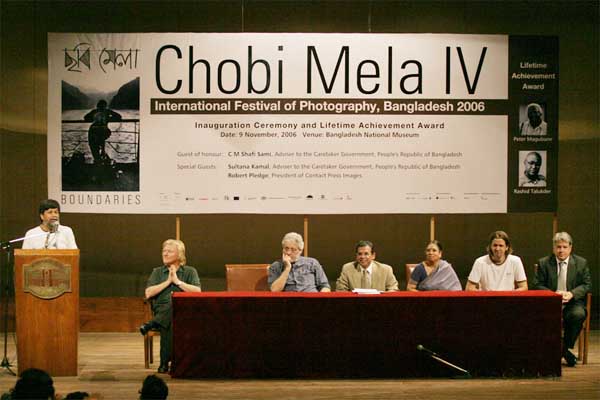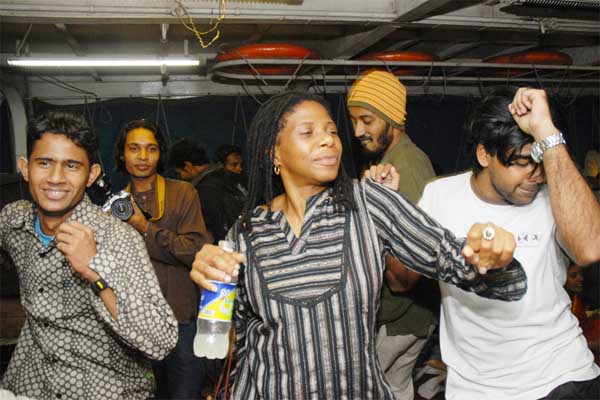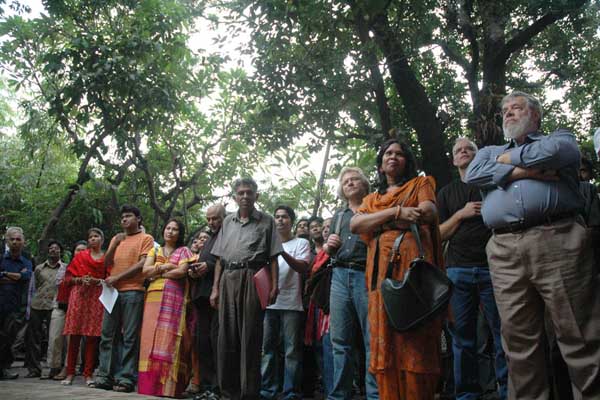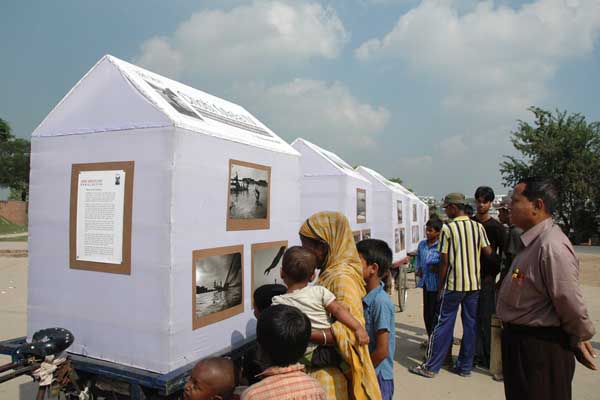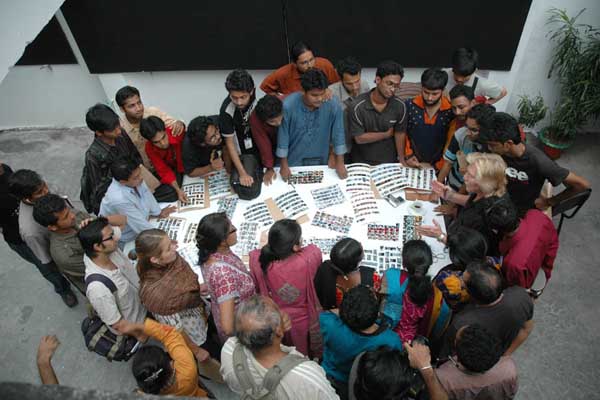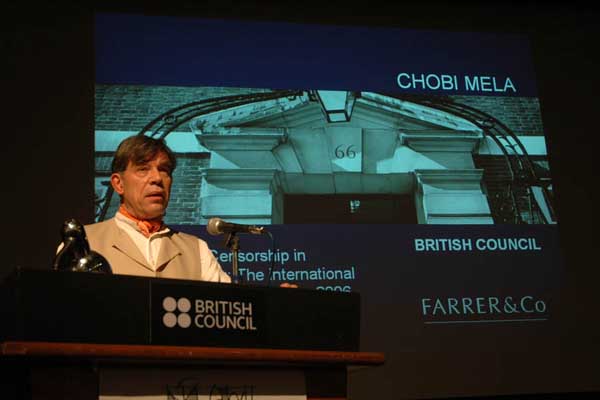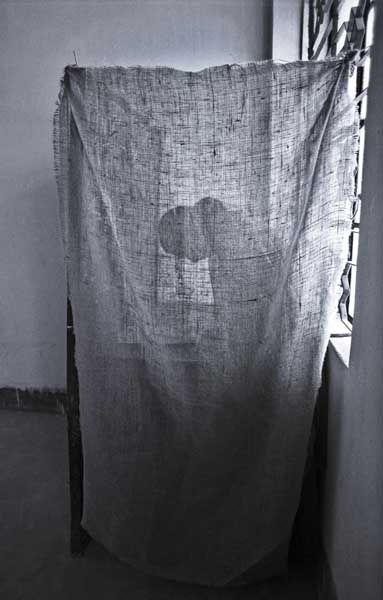![]()
Singapore Airlines warned of “protests by university students developing in Dhaka” as we boarded the plane. But emails from Delower and Rahnuma during the brief stopover in Singapore talked of the curfew in place in the six main cities. This was no longer a small skirmish in Dhaka University. Joshim was going to be at the airport with my accreditation card and we would try and find a way back home.

Students at Dhaka University under teargas attack, throwing bricks at police. 22 August 2007. Dhaka Bangladesh ? Munir uz Zaman/DrikNews
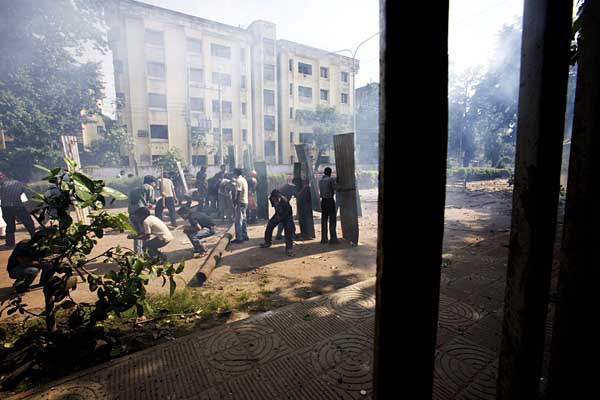
Students at Dhaka University shielding themselves with sheets of tin, during fights with police. Photographer anonymous.
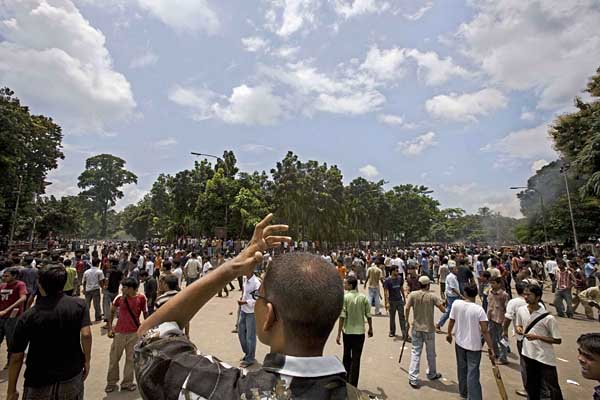
Protesting students gather at Dhaka University campus during violent clashes with police. Photographer anonymous.
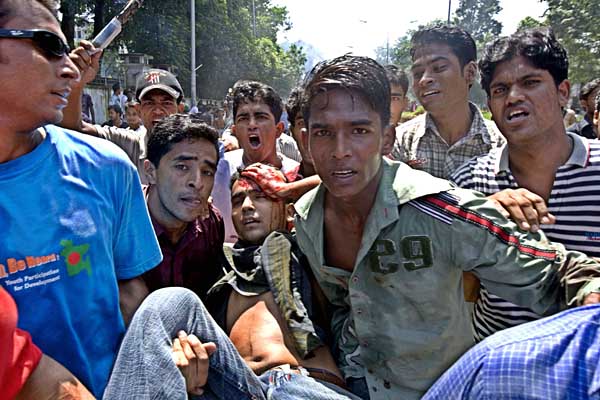
Student hit by police shotgun bullet being carried away by fellow students. Photographer anonymous.
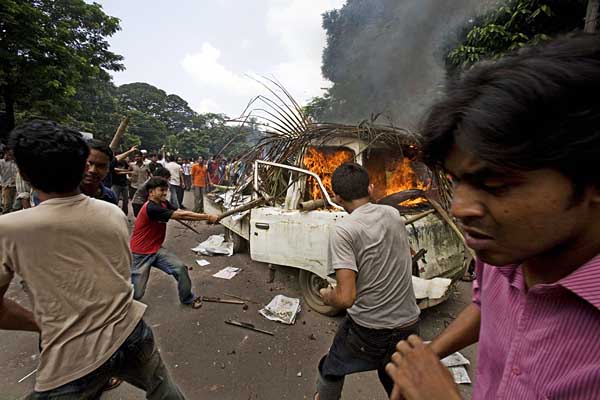
Enraged students burn a car at the Teacher’s Student’s Centre (TSC). Photographer anonymous.
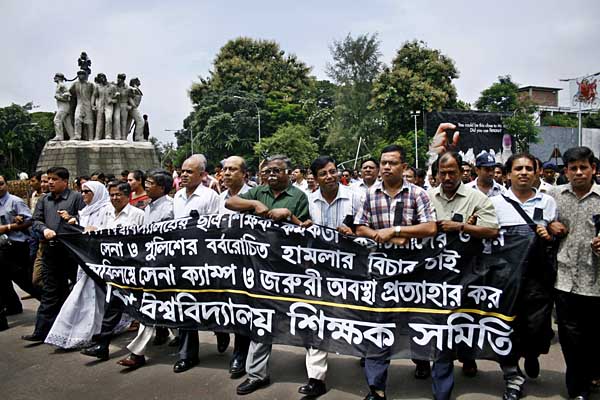
Members of Dhaka University Teacher’s Association protesting against the attacks on campus by police and army, and demanding withdrawal of the state of emergency. Two of the teachers in the front row have since been arrested. 22 August 2007. Dhaka Bangladesh ? Munir uz Zaman/DrikNews
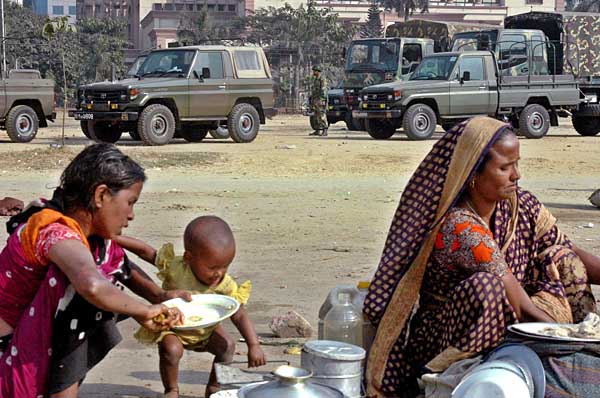
Rocketing prices of essentials create extreme distress for people with low earnings, like the people pictured in the foreground. The military of Bangladesh, which has not had to fight since the birth of the nation in 1971, has in the meanwhile, had increasing budgetary allocations in each successive regime. Numerous allegations about corruption in military purchase, has gone uninvestigated. 22 August 2007. Dhaka Bangladesh ? Munir uz Zaman/DrikNews
The government had taken all mobile networks off the air. With only official press releases for information, the person in the street was in for a rough time. It was easy to find Joshim in the empty car park. Only the occasional long distance truck plied VIP road. I put the video camera on record mode, but relied on my less conspicuous LUMIX to photograph the empty streets. Though I stopped on the Mohakhali flyover to take pictures, I was nervous when the RAB vehicles passed below. There was never a good time for being arrested, but this was as wrong a time as it could get.
Aaasteeey! The policeman strode over lazily. Ki bapar? I did have my card dangling from my neck, and from previous experience, used my confident, ‘I belong here’ approach. That usually worked best with low tier security people.
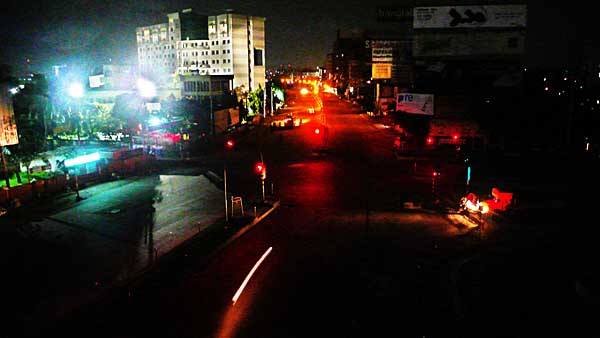
The Mohakhali Junction, one of Dhaka’s busiest traffic spots, is empty on the night of the 22nd August, when the government called an indefinite curfew. Dhaka Bangladesh. ? Shahidul Alam/Drik/MajorityWorld
I’d stopped to take pictures by the near-empty Tejgaon rail station. Stepping carefully through the people sleeping on the floor, I came up to Shahjahan and Neela. Unaware of the curfew, they had brought their sick child Shamim from Tangail, but got stranded in Tejgaon. There was no food, no doctor, no place to sleep, no way of knowing how long this would go on. Each visit to the toilet cost 5 Taka.
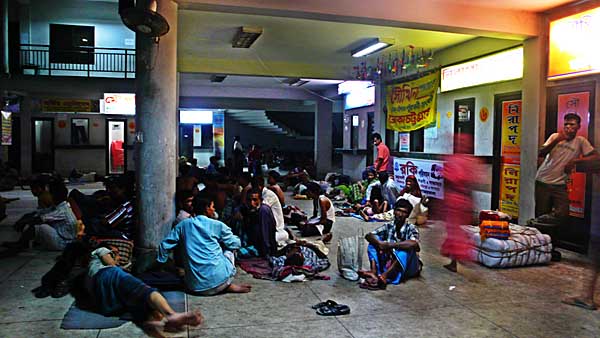
Stranded passengers at Tejgaon Railway Station, sleep on the floor. 22 August 2007. Dhaka Bangladesh. ? Shahidul Alam/Drik/MajorityWorld
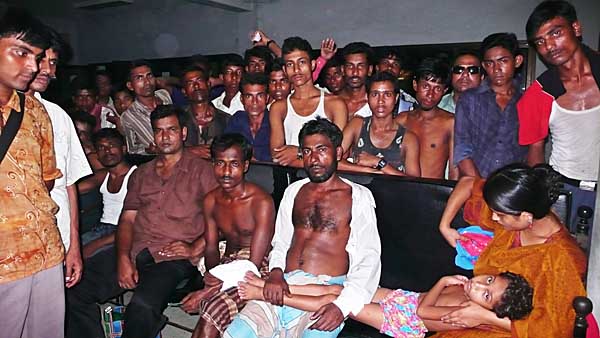
Shahjahan and Neela tend to their sick child Shamim, whom they had brought to Dhaka for treatment. Along with other stranded passengers at Tejgaon Railway Station, the family had no food or drink, or a place to sleep. 22 August 2007. Dhaka Bangladesh. ? Shahidul Alam/Drik/MajorityWorld
The next checkpost was slightly more hostile, but the expired accreditation card dangling from my neck was working overtime. We passed without much harassment. Dropping Joshim home, I went past the Shonar Bangla Market in Karwan Bazaar. The busy market place had a haunted look. No cackle of chickens, haggling for prices, or calls from vendors. Just one man counting loose change.
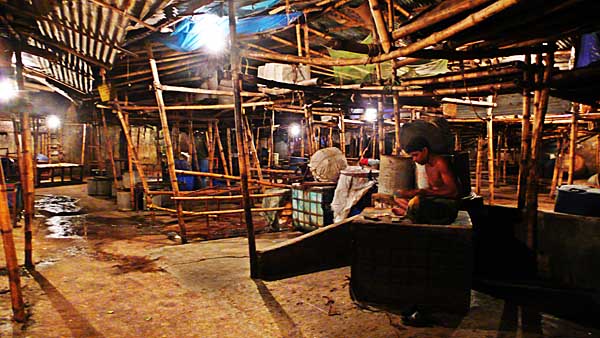
Shonar Bangla Market at Karwan Bazaar is one of the busiest market places in Dhaka. The shops are empty on the night of 22nd August 2007. Dhaka Bangladesh. ? Shahidul Alam/Drik/MajorityWorld
The brightly lit Square Hospital in Panthapath stood out in the dark. Government orders to turn down the lights after dusk to save electricity was presumably for commoners only. The street was empty, but this time as I approached with my camera police converged from all directions. I fumbled a bit, but recovered in time to get one shot. This was not the time to look for best angles. Rattling off important sounding words like ministry of information, and dropping the occasional names I could think of, I got into the car and drove off before the uniformed men had gathered their wits. A government adviser’s business interests in Square Pharmaceuticals – while undeclared – was well known. Students had already attacked the building the previous day. The approaching police knew whose business interests to protect.
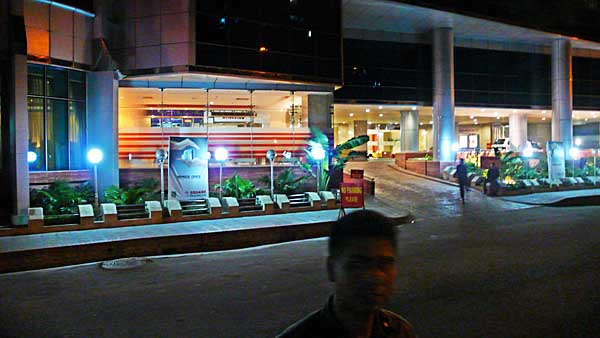
The Square Group, one of the wealthiest business enterprises in Bangladesh owns the Square Hospital. Government regulations prohibit the excess use of electricity and non-essential shops are required to close by 8 pm. Several people were killed by the police when they came out in protest, demanding adequate electricity. The Square Group is owned by the family of one of the advisers of the caretaker government. 22 August 2007. Dhaka Bangladesh. ? Shahidul Alam/Drik/MajorityWorld
The road through Dhanmondi was eerie. The women who walked the streets near Abahani playground were nowhere to be seen. Like the many others who struggled to make a living, they too would not be earning tonight.
The junction near ULAB was scarred by burnt tyres. The convoy of police vans deterred me from getting my camera out and I turned into road 4A. It was time to go home. Kamaler Ma, Joigun, Zohra and Rahnuma were all up waiting. With the mobile network off, they didn’t have any news about me. There must have been others in many more homes who were up worrying.
Rahnuma and I talked of the events over the last two days, of the army camp in Dhaka University. Of a soldier slapping a student. Of the vice chancellor (acting) being beaten up by police. This had never happened before, not even during the Ayub or Ershad military regimes. The reference to ‘evil doers’ in the chief adviser’s speech to the nation was worryingly close to the ‘axis of evil’. Independent media channels were then still defiant. That night the information adviser advised the media to practice ‘self censorship’.
Despite their claims, this government had never been called in by the people. We had no say in who the advisers would be. It was not military rule the people had welcomed, but the cessation of violence and the fear of further anarchy if the rigged elections were held. Banana trees would have made equally good replacements. However, banana trees would not have sold national interests. Closed down environmentally-friendly jute mills. Made slum dwellers homeless, or tortured and killed adibashis protesting the military acquisition of their ancestral lands. So while there was initial relief, as the price of essentials soared, news of nepotism and the partisan manner in which Jamaat -e-Islami was being shielded soon made people realise this banana tree would never bear fruit, let alone run a government.
Warrantless arrests by plainsclothes army under the cover of curfew. Dissenting teachers picked up in the middle of the night. Making threats to independent channels ETV and CSB are hardly the character of a saviour government pledged to the return of democracy. As the behind-the-scene military decides it will now take centre stage. As Bangladeshis realise that a democratically elected autocratic government has simply been replaced by an unelected autocratic one, the tune in the streets is changing.
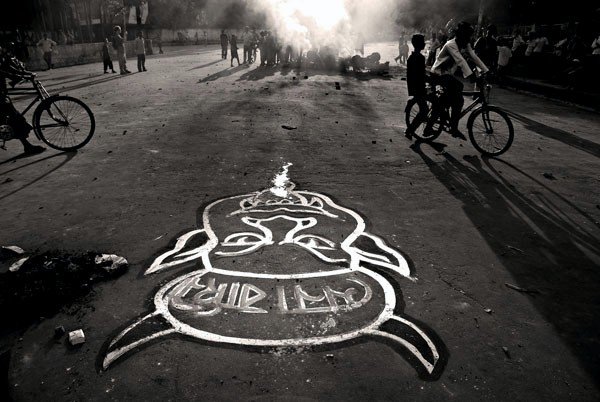
Symbols of fascist oppression drawn on university road. 21st August 2007. Dhaka Bangladesh ? Munem Wasif/DrikNews
Multiple demands of students and teachers have been whittled down to one – withdraw emergency rule. Underground pamphlets are spreading like wildfire. With the Internet down, text messages are filling up the ether. The information adviser’s suave statements to the media faltered as he snapped, “why such a fuss about a slap or two?”
****
The photograph that was being shown here has been removed on the request of the photographer
****
“In unprecedented scenes, soldiers in uniform were seen being chased out of the Dhaka university campus by students. In two days, the myth of the army’s omnipotence was all but laid to rest.” BBC. Photographer Anonymous.
The US has declared support for the chief adviser’s statement. What he lacks is the support of the people.
Category: Military
The Trojan Horse
Standing in the grand parliament building in Karachi, built by his grandfather, veteran Pakistani MP Qamar Zaman reflected on the irony of it all. He had long campaigned against the militarization in Pakistan, but recent developments in Bangladesh worried Zaman. ?They saw what went wrong in the Pakistani experiment and decided to fine tune it? he lamented. The election commissioner in India, SY Quraishi, repeated the sentiment. Bangladesh following in Pakistan?s footsteps was not something he welcomed. Kunda Dixit, in Kathmandu, talked of how the same blueprint was being used in all our countries. Despite the rhetoric of democracy, the militarization of South Asian countries was the flavour of the day. Aided by chaotic situations created by political mismanagement, the anti-corruption Trojan Horse brought in its deadly military content.
As in Troy, the people had welcomed them with open arms. Years of mismanagement and corruption had worn down their patience. People wanted respite, regardless of where it came from. This was just the window the military needed. Not wanting to lose out on the lucrative UN placements, they needed a mask. The ?neutral? caretaker government was the perfect foil. The arrests of corrupt politicians, businesspeople and godfathers provided a much needed relief. Few worried about the flimsy, and sometimes concocted accusations used to reel them in. None dared to speak of the glaring omissions. Curbing media freedom took care of the main obstacle. The military or the Jamaat were strangely absent from the list. Amongst the largest and most controversial deals made during previous regimes were the MIG and the Frigate purchases. Yet neither had featured in the cases being investigated. ?kaker mangsho kak khai na.? (A crow doesn?t eat crow?s meat).
After much foot dragging, and over two months of delay, a one member body was asked to probe into the death of adivasi activist Choles Ritchil in the most gruesome killing while in military custody. The Shadarghat launch disaster, in contrast, had three separate investigation committees ordered to submit reports within 24 hours. Choles on the other hand had resisted a multimillion dollar deal to take over adivasi land. It was a different ball game.
Tasneem Khalil was one voice that they had not been able to silence. His incisive, well researched investigations flew against the culture of silence that prevailed. Mahfuz Anam, the editor of the leading English daily, The Daily Star, had proudly told me, ?In all these years, not a single story had been spiked.? That was some time ago. Things were different now. The story of military involvement that Tasneem had revealed was pulled back from the press in the last minute. A commentator on the roundtable at Drik on the 3rd May, International Press Freedom Day, had equated the Daily Star and the Daily Prothom Alo with a new political party. The newspapers had elaborate reporting on the US ambassador’s love for democracy and a free press. The Drik roundtable, featuring some of the bravest journalists working in the land, went unreported. The roundtable had discussed the military, the corporate deals taking place, the heavy hand of foreign countries. It talked of deals being pushed through in the absence of dissent. Tasneem had deliberately not been asked to speak. That would be inviting trouble.
That didn?t protect Tasneem for long. In my room in Shangri La Hotel in the early hours of this morning I received an SMS from a student. Tasneem had been picked up from his home. This is a risk that all journalists speaking against the?government are prepared to take, but given what Choles Ritchil went through, this arrest is more ominous. A suicide note for an epitaph is too likely an outcome to let the system take its course.
Shahidul Alam
Kathmandu
11th May 2007
From SAJA list:
Daily Star reporter (formerly with New Age), and CNN Dhaka stringer, Tasneem Khalil was
picked up by men in plain clothes @ midnight, claiming to be from
“Joint Forces”/Army.
Tasneem Khalil Picked Up By “Joint Forces”
CNN Reporter Picked Up
Tasneem’s Blog
Tasneem, We’ll Come Get You
http://salamdhaka.blogspot.com/
Human Rights Watch Issues Alert
Tasneem on Choles Ritchil Case
Tasneem on Modhupur
Tasneem quoted in Washington Post
Sabash Bangladesh!
Searching for solutions
![]()
It was 1985, when Jun Jun and I came over for our first trip to Nepal. I had nearly died of hypothermia in our trip to the Everest Base Camp, and Jun and a Japanese explorer had saved my life. My subsequent trips to Nepal have been marked by other drama. As I left for the airport yesterday, Navaraj, the tutor at Pathshala from Kathmandu reminded me that I was going to a new Nepal, one no longer under the rule of the king. Sapna, the human rights lawyer we interviewed in Kathmandu today, remarked wryly, that it was a Nepal ruled by many kings. With the Moaists now in government, one hopes that at the least the violence will go down. Too many lives have been lost.
The killings and disappearances in Nandigram in the largest democracy in the world, and the recent killing of the Adivashi Garo activist Choles Ritchil in the most brutal manner imaginable – ?Choles?s two eyes plucked, testicles removed, anus mutilated, two hand palms smashed , nails of 3 fingers of the right hand removed, left hand thump finger nail removed, two palms had holes, upper right hand had severe wound, several blood stains on the back part of the body, in both thighs middle part there had been two holes, back part of the body had several black marks, several deep marks of wounds on both lower legs, there had been black marks on feet, no nail on thump of right foot, all fingers of two hands were broken.? – by the much lauded new regime in Bangladesh are worrying signs. With conventional media under threat, bloggers become the lonely and marked whistle blowers.
Majority world photographer and All Roads winner from Guatemala Sandra Sebastian is one of many activists in search for solutions.

I couldn?t believe that passers-by weren?t killed when a shooting occurred between drug traffickers on a busy day in one of the principal avenues in Guatemala City. Two presumed drug traffickers were murdered in their car, which had lots of AK-47 bullet-holes. There were hundreds of bullet-holes all around the avenue. The walls of a school and a bus stop where many people usually sat, were also riddled. Unfortunately two men died, but it could have been a massacre. How many people have to be killed before something is done?
I wasn?t the only astonished person. I took the picture because I want to document and leave a testimony of the time I live in and show the danger that ordinary people face. In the last year alone (2005) more than 5,000 people were killed in street violence in a country of 13 million people. The reasons? Delinquency, organized crime, drug trafficking, poverty, broken homes. I want to talk of the inefficient justice system and the impunity with which some operate. I want to point to the consequences, and hope people can understand and search for solutions.
1971 as I saw it
![]()
Thirty five year ago, even longer perhaps, just a camera in hand, they had gone out to bring back a fragment of living history. Today, those photographs join them in protest. Peering through the crisp pages of the newly printed history books, they remind us, “No, that wasn’t the way it was. I know. I bear witness.”
The black and white 120 negatives, carefully wrapped in flimsy polythene, stashed away in a damp gamcha, have almost faded. The emulsion eaten away by fungus, scratched a hundred times in their tortuous journey, yellowed with age, they bear little resemblance to the shiny negatives in the modern archives of big name agencies. They too are war weary, bloodied in battle.
So many have sweet talked these negatives away. The government, the intellectuals, the publishers, so many. Some never came back. No one offered a sheet of black and white paper in return. Few gave credits. The ones who risked their lives to preserve the memories of our language movement, have never been remembered in the awards given that day.
35 years ago, they fought for freedom. They didn’t all carry guns, some made bread, some gave shelter, some took photographs.
(c) Abdul Hamid Raihan
Abdul Hamid Raihan is one such photographer. A.S.M. Rezaur Rahman came upon him through a small interview on television. Unlike many other photographers, Raihan had preserved his negatives. And unlike many researchers, Reza had doggedly pursued. The exhibition, “1971, as I saw it” is not a record of momentous events, but a rare glimpse of what everyday people might have witnessed under occupation and through victory. press-release-english-bangla.doc
——
Autograph ABP presents: The John La Rose Talk Series
Documentary Photography & Social Change: Mark Sealy in conversation with Lyndall Stein and Shahidul Alam at Amnesty International UK
Amnesty International UK
The Human Rights Action Centre
17 – 25 New Inn Yard
London EC2A 3EA
6.30pm – 8.00pm 29th March 2007, Phone +44(0)20 7033 1500, Nearest Tube: Old Street, Moorgate & Liverpool Street
In an age where our daily lives have been saturated by images of globalization there has been a revolt by NGOs and arts organisations who are beginning to forge links and alliances to explore new ways of using visual culture to discuss issues that address a human rights agenda in the 21st century. It is in this context that Mark Sealy the Director of Autograph ABP will explore a conversation that looks specifically at the role photography has played in helping to bring global human rights issues to a wider constituency.
A student screams out to friends from a police van at Jagannath Hall, Dhaka University, after a police raid. 31 January 1996. (c) Shahidul Alam/Drik
—-
Meanwhile Bangladeshi photographers shine at the 3rd China International Press Photo (CHIPP) Contest held in Shanghai from March 21 to 25, 2007


Former Pathshala student Munem Wasif, now working with www.driknews.com wins the bronze prize in the Daily Life category with a powerful piece showing modern forms of slavery, through his story on the workers in the tea gardens of Bangladesh.
Former student of Pathshala and University of Bolton and currently tutor of Pathshala – Andrew Biraj – wins the bronze prize in the Topical News category with his timely piece about the attempts by multinational companies to take over land of indigenous communities,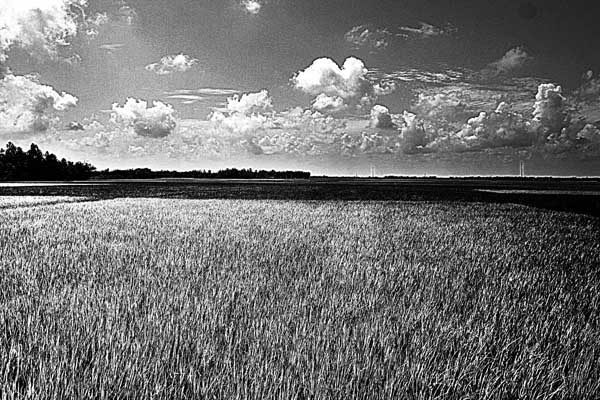



while photographer Shafiqul Islam wins an honourable mention in the same category for his piece on police brutality against women. Biraj and Shafiq are both contributing photographers of DrikNews.

Meanwhile on it’s independence day, Bangladesh moves towards the final eight in the ICC World Cup! However, while we celebrate these wins and the recent arrests of godfathers and the ongoing cleaning up operations, the new laws curbing public freedom continues to worry. The death of Garo activist Cholesh Ritchil (http://www.drishtipat.org/blog/2007/03/19/urgent-modhupur-eco-park-activist-killed-2/) in the hands of ‘Joint Forces’ makes us fearful of the consequences of absolute power.
From Dili to Delhi
![]()
I had just left behind a tense East Timor. No rice for several weeks? violence had again erupted on the streets. I had expected my one day pit stop in Dhaka, on my way to a UNAIDS assignment in India, to have been less eventful. Dili to Delhi had a nice ring to it. The plane had arrived in the early hours of the morning, and as I sat at Drik trying to finish the million pending bits that invariably pile up, Rahnuma rang to talk of the fire. Soon we were up there, outside the familiar building where I?d recently given interviews. Through the billowing smoke, my NTV and RTV mugs reminded me of how close our lives constantly were to needless tragedies shaped by irresponsible gatekeepers. I wondered whether the new gatekeepers in power, ushered in by an unspoken coup, would be different. They had started well, arresting corrupt individuals, and attempting to establish the rule of law, but the sinister rumblings of indefinite stay, had all the signals of previous regimes while the significant omissions in their ?hit list? was deeply worrying. On the plane Farhad Mazhar and I talked of having to brace ourselves for new measures designed to make us more safe. As for the disproportionate influence of ?friendly nations?, swapping freedom for security appeared to be the order of the day. I wish we had a choice on whom to befriend.
Naeem?s translation of Anisul Haque?s moving Op Ed, and Peu?s mail pointing to Munir?s powerful images,
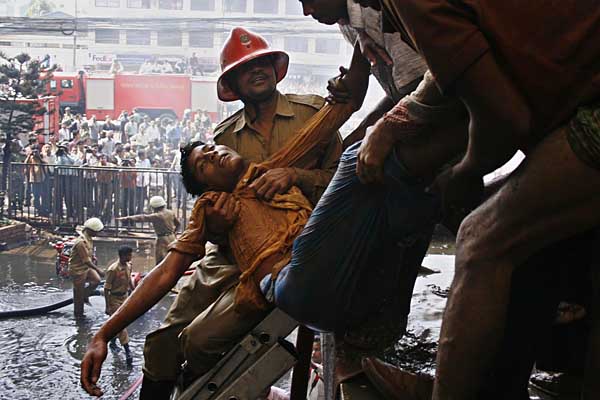
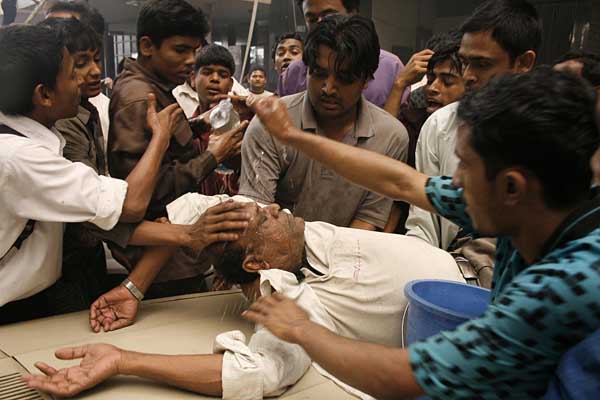
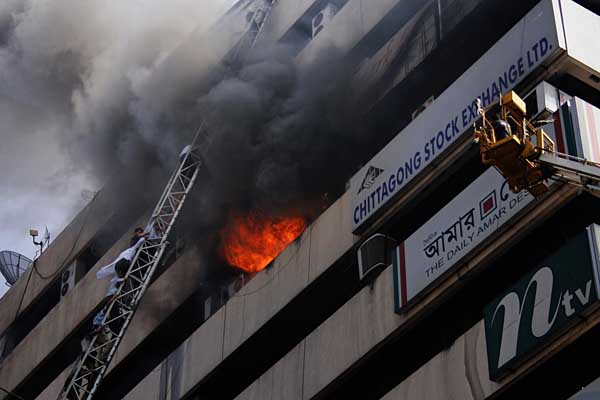
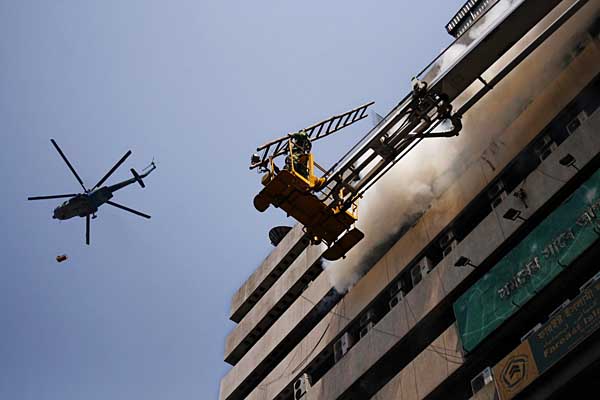
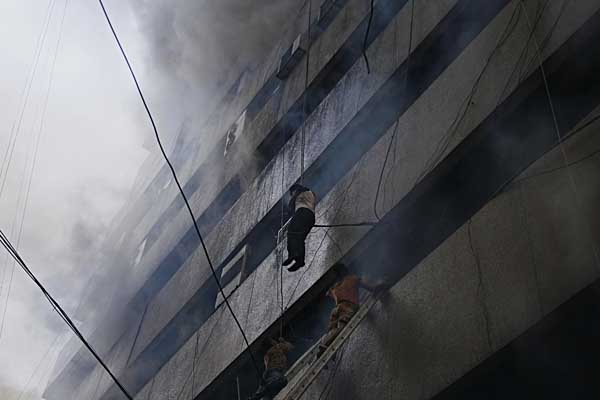
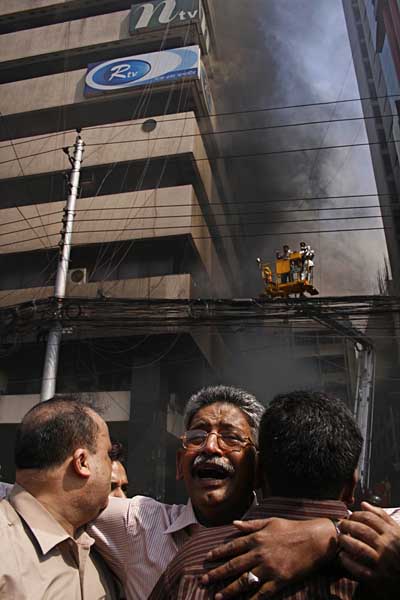 Photographs copyright Munir uz Zaman/Driknews. (Permission for use and high resolution images available from www.driknews.com).
Photographs copyright Munir uz Zaman/Driknews. (Permission for use and high resolution images available from www.driknews.com).
bring home a message too often forgotten. As Shupon points out, we forget very easily. As we?ve forgotten the deaths in the garment factories, or the ferry disasters. But then, those had involved the death of poor people.
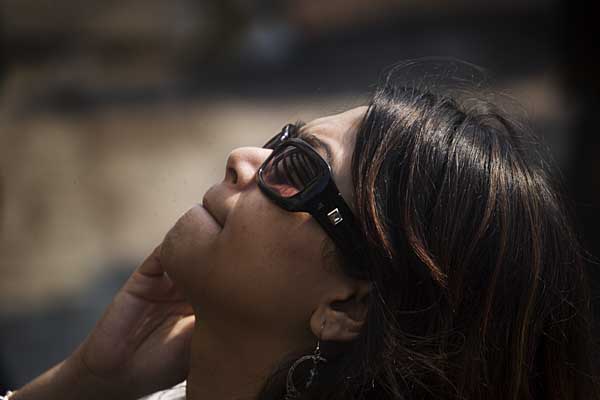 copyright: Shahidul Alam/Drik
copyright: Shahidul Alam/Drik
The near death of the well to do could perhaps have a more lasting memory.
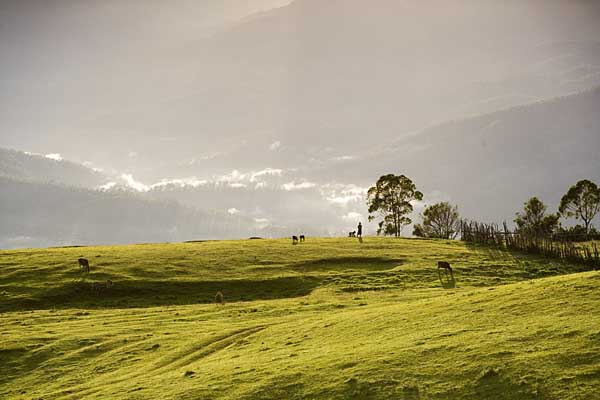 copyright: Shahidul Alam/Drik
copyright: Shahidul Alam/Drik
The tranquil mornings in the mountains of East Timor seemed a long way away.
Shahidul Alam
Delhi
27th February 2007
I can kill any Muslim
![]()
Year end play: The Nuculier God
Theatre: The World
Set Design: Tony Blair
God: George Bush
Sacrificial Lamb: Saddam Hussein
Slaves: Saudi Royal Family and cohorts
Extras: The United Nations
Theme song: I can kill any Muslim
I can kill any Muslim
Any day I choose
It?s all for the cause of freedom
I can kill any Muslim
Wherever I choose
It is cause we?re a peace lovin? nation
So we egged him on
When he attacked Kuwait
And the trial may have been harried
So we supplied him arms
To gas the Kurds
With him dead, that?s one story buried
Violence in Iraq
Has been on the rise
The US can hardly be blamed
Our interest was oil
And we stuck to our goal
Why must my cronies be named
Saddam?s emergence
As Arab resistance
That wasn?t part of the plan
Had Amnesty and others
Kept quiet when it matters
We?d have quietly gone on to Iran
Asleep I was
When he hanged on the gallows
Well even presidents need to sleep
Oblivious I was
When the planes hit the towers
I had other ?pointments to keep
More Iraqis dead
More ?mericans too
OK they warned it would happen
Why should I listen
When I rule the world
No nation?s too big to flatten
The Saudi Kings
They know their place
At least they?ll know by now
Muslim?s OK
If you tow the line
Out of step, off you go, and how
Tony and me
We keep good company
Dictators know when it matters
Regardless of crimes
And religious inclines
Safe if you listen or its shutters
I can kill any Muslim
Wherever I choose
I choose quite often I know
I can kill any Muslim
Any day I choose
I did it so now they will know
Similar to Rumsfeld’s concern that the Abu Ghraib pictures coming out, and not about the events themselves, the Iraqi government worries about the footage of Saddam being taunted, getting out. The fact that the taunting took place doesn’t appear to be an area of concern. With the US government stifling Al Jazeera, and increasing censorship in mainstream media, citizen journalism appears to be the only way people can get past the PR camouflague.
With all political parties of Bangladesh, as well as most Muslim leaders around the world, choosing to remain silent at the execution of Saddam Hussein, it is left to human rights organizations to remind us, that despite his atrocities, Saddam will be remembered for his defiance. The butcher of the Kurds will go down in history as a victim of flawed justice. The guns are now clearly turned against Iran, but the Saudi rulers, as well as the Egyptians and the Jordanians would do well to ponder, ?Who is next??
Reselling Your Soul to the Devil
![]()

20th anniversary of Ain O Salish Kendra and National Museum auditorium, Dhaka. Bangladesh

Fazle Hasan Abed (left), Muhammad Yunus (centre) and George Soros (right)
Muhammad Yunus, Amartya Sen, Fazle Hasan Abed, George Soros Sultana Kamal. I could hardly have asked for a better photo op. Well it is Christmas! If ever a nation was in need of a pick me up, this was it. The twentieth anniversary of Ain O Shalish Kendra (ASK) had a special significance. This was an organization that has been relentlessly fighting for the rights of the downtrodden. Despite the central bank predicting a 7 percent growth in the coming year, with both parties poised to contest the upcoming election choosing to woo the autocratic general the people had fought to overthrow, and the traditionally secular Awami League (AL) selling out to the Bangladesh Khelafat Majlish (BKM) for supposed electoral gains, the people needed the assurance that at least some still believed in a secular state and the interests of common people.

Amartya Sen lauded ASK and women?s agencies for the role they had played in upholding the rights of women and talked of the importance of freedom of speech.

Muhammad Yunus reminded the audience of ASK?s role in preserving the legal rights of the poor. Both Nobel laureates stayed clear of commenting on the decision that had been made by the major opposition party, which had just buried all of these ideas for political convenience.

Sen gave an eloquent speech, weaving history and his own characteristic economic analysis to point to the role civil society could play in creating a more egalitarian world.

His witty anecdotes about Salma Sobhan, the diminutive but feisty human rights activist who had founded ASK, and his frank accounts of the attempts by him and his friend, our own celebrated economist Rehman Sobhan, in winning over Salma Banu, before she became Salma Sobhan, was a warm and sincere tribute to one of Bangladesh?s finest citizens. But despite the joy of celebration, the mood in the audience was less than ebullient. The high court ban on fatwas had been a hard won battle and the gloom caused by AL?s entente with the other side of the fundamentalist coin, had left everyone shattered. My activist friends were surprisingly unperturbed. ?Well, they have unmasked themselves? said Khushi Kabir, ?it is time we woke up to what the parties really represent.?

Sultana Kamal was similarly defiant but also brought up her concerns. ?It has always been our fight, and now we know what alliances to avoid. But they have effectively robbed me of my voting rights. If I now want someone in parliament to stand up for the rights of women, or the Ahmadiyyas, or for free speech, whom do I turn to? The candidates too have no choice. The few who might have wanted to enter the fray because they wanted to change things, now have no party to turn to.?
Politicians are not known for honesty and candour. AL?s win at any cost deal was defended by Abdul Jalil, the general secretary of AL who signed the document, as he tried to wriggle his way out of the hole he had dug himself into. ?It is an understanding based on an election strategy? and ?any decision is a fatwa? he rambled.
This particular election strategy seems to have left out the voters from the equation. The latest ?fatwa? by the Awami League is a ?decision? that will haunt them.
Taking care of the caretaker
It was a dramatic ending to Robert Pledge?s presentation. Via Topu and Omi, I?d received the news that the military had been called out. Robert wanted to finish the presentation, but once I?d announced the government?s decision, the auditorium of the Goethe Institut quickly emptied out. This particular Chobi Mela IV presentation had come to an abrupt end. It was 1987 revisited.
Noor Hossain had painted on his back ?Let Democracy be Freed? and the police had gunned him down on the 10th November 1987. But the people had taken to the streets and while we were scared the military would come out, there was no stopping us. It had taken three more years of street protests, before the general was forced to step down. The people had won. But then it had been a military general who was ruling the country. This was a civilian caretaker government. The general mistrust of a party in power, had resulted in this unique process in Bangladesh where an interim neutral caretaker government headed by a Chief Adviser (generally the most recently retired Chief Justice) and consisting of other neutral but respected members of the public were entrusted with conducting the elections. Why then the military? Yes, the president was a Bangladesh Nationalist Party (BNP, the largest party in the outgoing coalition government) appointee, there are ten advisors who are meant to be neutral.
A free and fair election hasn?t yielded the electoral democracy we had hoped for. After each term, the people have voted out the party in power, only to be rebuffed by a political system that has never had the interest of the people on their agenda. Still, the elections were held, and despite the fact that there had been one rigged election in 1996 (rejected and held again under a neutral caretaker government), an electoral process of democratisation, was slowly developing.
This time however, the total disregard for the electoral process has created a sham, and the three key people in this electoral process, the president, the chief adviser, and the chief election commissioner (CEC), are colluding against the people. The first two, being represented by the same person, was a BNP appointee. He also happens to be the head of the military. The CEC, now a cartoon character, had also been appointed by the BNP while it was in power. Coupled with a clearly flawed voters list, this has removed any hope of a free and fair election. Can the caretaker government genuinely conduct a fair election? I believe it still can, if given the chance, despite the president?s lack of credibility. But for that to happen, the military, the bureaucracy and the police need to remember that it is with the people that their allegiance lies.
However, it does depend upon the removal of the other obstacles. The election commissioner cannot constitutionally be removed, and his removal is central to the opposition demands. What then can we do? There is only one body higher than the constitution, the people themselves. The advisors need to be empowered if they are to pull off this election. Sandwiched between a partisan executive head and another partisan CEC, the advisers risk becoming irrelevant. The only way this can be checked is if people come out in droves. Not ?hired for the day? supporters but ordinary people committed to civilian rule, and a multi-party system.
It is we the people who need to take to the streets. And it is time we sent out the message to all political parties, that an entire nation cannot be appropriated. They need to be told that we did not liberate our country in vain, and despite the poverty and the hardship that we go through, we will not be cowed down, and will not blindly tow a party line, when the party itself has disengaged from the people. If tomorrow, every woman man and child takes to the street of Bangladesh, there is no power, not the military, not the president, not the advisers, not the CEC, not the BNP and not AL that can stop us.
There is hope yet. The advisers have had the good sense to reverse the home ministry?s unilateral decision to call out the army and the president and chief adviser has been challenged for taking such a step. Whether the advisers can continue to take such bold steps depends on our ability to bolster their nebulous position.
Blockades and hartals do hurt the economy, and ironically, it is the person in the street who is the most vulnerable. But faced with an attempt to take away the only chance she has to exercise her right to elect the government of her choice, she has little option left but to take to the streets. As the world is finding out, in Iraq, in Afghanistan, and wherever else there is conflict, a military victory is never a victory. If the anger of the people is to be quelled, then the underlying causes of discontent need to be solved. Flexing the muscles of the military, will only put a lid on the boiling pot, and the longer the lid is pressed down, the bigger will be the eventual explosion. More have died today, and with every death, the flashpoint looms closer.
Chobi Mela IV has continued despite it all. The dancing in the all night boat party,
the heated arguments at every meeting point, the mobile exhibitions, all went on despite the turmoil. The presentations on the night of the 11th, with Yumi Goto, showing work by the children from Bandar Aceh, Neo Ntsoma showing her work on youth culture in South Africa, Chris Rainier showing his long term projects on ?Ancient Marks?, and the deeply personal, but very different accounts of Trent Parke
and Pablo Bartholomew, made one of the most intriguing evenings I can remember. The packed audience that had braved the blockade had perhaps an inkling of what was to come. Morten had a full house for his ?gallery walk? at the Alliance Francaise and Trent?s workshops were packed out. The grand opening was at the National Museum, where we had one fifth of the cabinet opening the show. Kollol gave a passionate rendering of his song ?Boundaries? written especially for the festival. The rickshaw vans designed to take the festival to the public, plied the streets of Old Dhaka, Mirpur and other areas not used to gallery crowds.
The chief guest, adviser C.M. Shafi Sami, the special guests adviser Sultana Kamal and Robert Pledge, photographers Morten Krogvold and Trent Parke and the scholarship recepient Dolly Akhter all spoke eloquently. Little did the audience know about the drama that had taken place the night before. With the museum functionaries doing their best to keep us from putting up the Contact Press Images show (http://www.chobimela.org/contact_press_images.php), we were under pressure, but working all through the night and sleeping on the museum floor, we managed to put the show up on time.
Last night, the empty streets, looked ominous as I dropped off Chulie, Robert and Yang, and people have been dying in the streets.
Since then we have had Morten Krogvold?s passionate presentation at the gallery walk at Alliance, Rupert Grey?s clinical dissection of the law and his dry British humour,
both at the British Council and the Goethe Institut, Saiful Huq Omi?s disturbing but powerful images of political violence, Cristobal Trejo?s poetic rendering of an unseen world, Richard Atrero De Guzman?s honest response to difficult questions about representation and my own presentation on natural disasters and their social impact have all been well attended, despite the tension in the desolate Dhaka streets. The evening presentations close tonight with an insightful film by Indian film maker Joshy Joseph, presentations by Norman Leslie and a behind the scenes look by the photographers at the Drik Photo Department, Md. Main Uddin, Shehab Uddin and Amin, Chandan Robert Rebeiro, Imtiaz Mahabub Mumit and Shumon of Pathshala and Mexican exhibitor Cristobal Trejo. The shows go on as they always do at Drik.
In 1991, a woman with her vote had avenged Noor Hossain’s death.
A fortnight ago, the city was in flames, and a stubborn chief election commissioner is stoking the flames again. It is a fire he and his allies will be powerless to stop.
Shahidul Alam
Dhaka
Chobi Mela site
Blog by Australian curator Bec Dean
Short video on Chobi Mela IV
Dhaka Burns
![]()
Well I’m finally stumped for words. A party affiliated president, now
has the triple roles of president, head of the military and head of
the ‘neutral’ caretaker government. While rumours of a military
takeover abound, and the prime minister’s son threatens that they will
not go to the streets ’empty handed’, the news that the leader of the
opposition has not threatened immediate protests, but has rather opted
to see how the new head of the caretaker government conducts himself,
is a healthy sign. Too many lives have already been lost.
A lot of changes need to take place to erase the mistrust created. A
genuinely non partisan group of advisers need to be selected, the
election commission and the voters list, both clearly not neutral,
need to be changed, and he has to clearly demonstrate that he is no
longer a puppet. Unlikely based on his track record, but one can hope.
Given the current mood, another sham election will surely light the
fuse.
Shahidul Alam
29th October. Dhaka
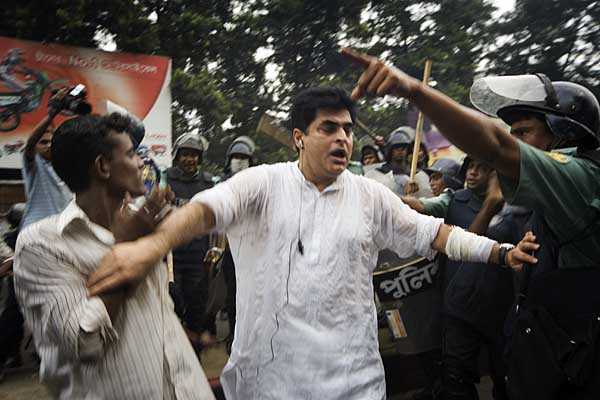
Clashes between opposition and Jamaat due to demand for neutral head of caretaker government. (upload incomplete)
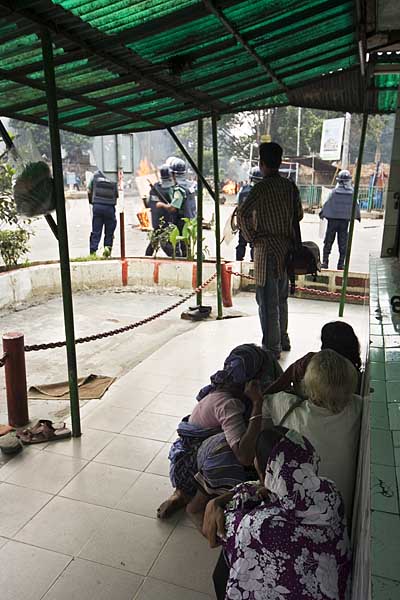
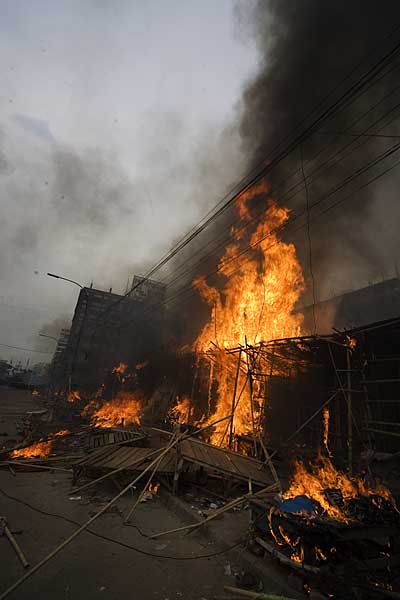
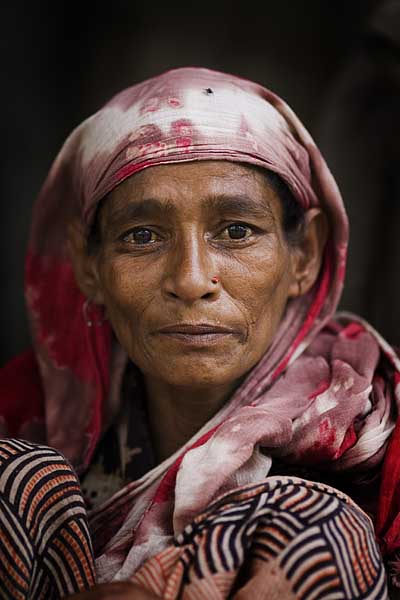
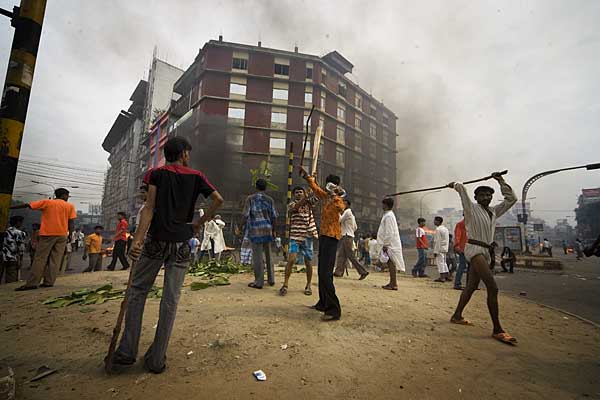
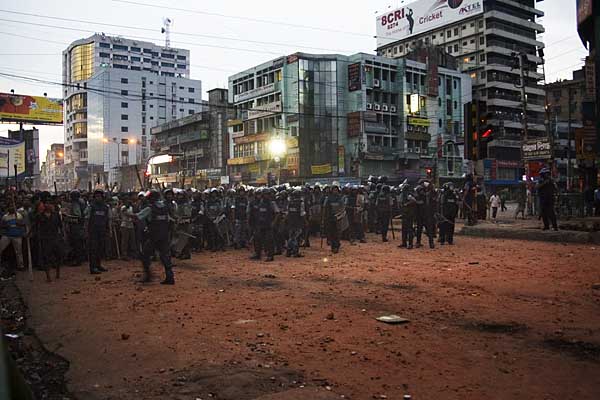
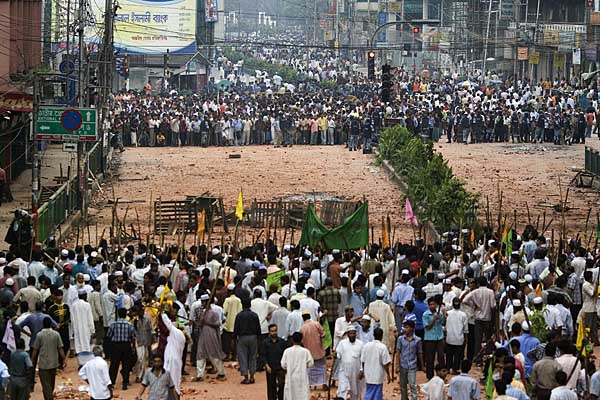
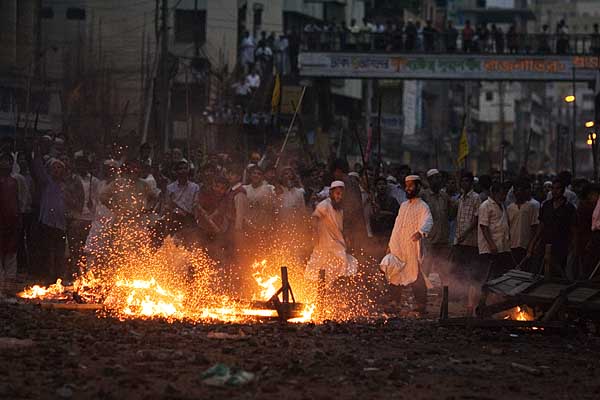
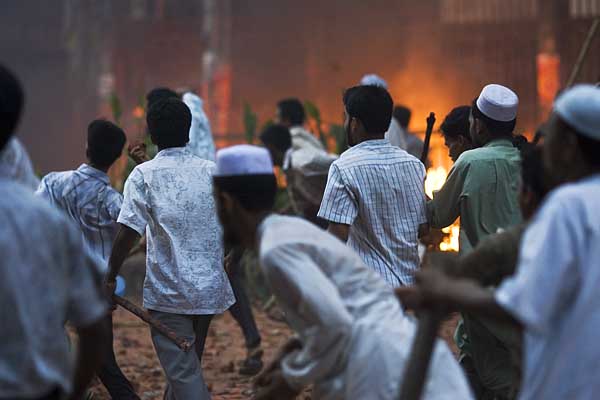
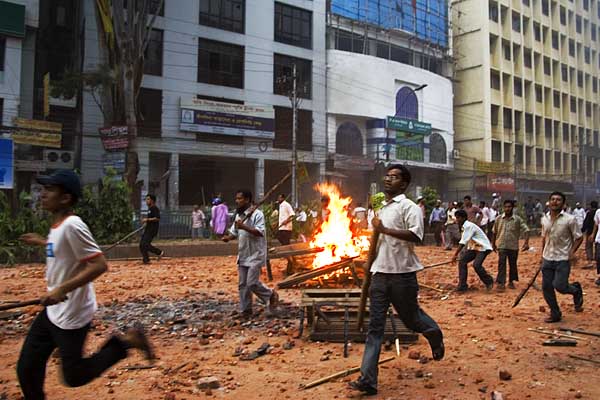
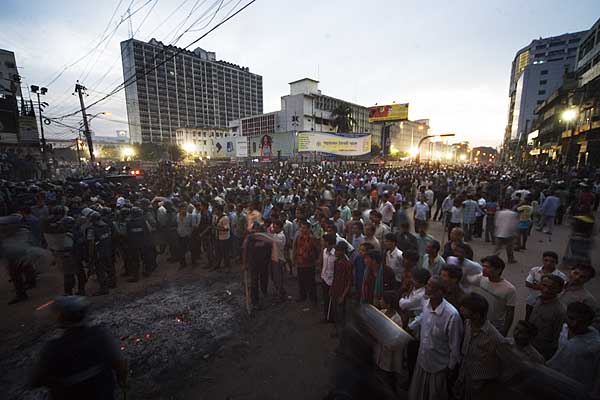
Above photographs taken on 28th October 2006 by Shahidul Alam.
And today 29th October 2006, a party affiliated president, makes himself president, head of military and head of ‘neutral’ caretaker government. Today’s photographs taken by Shehab Uddin. No unauthorised copying of any kind. To publish these or high res images, contact library@drik.net. More pictures and text to follow.
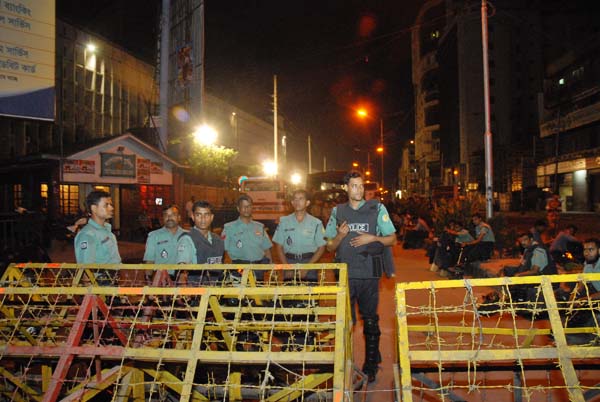
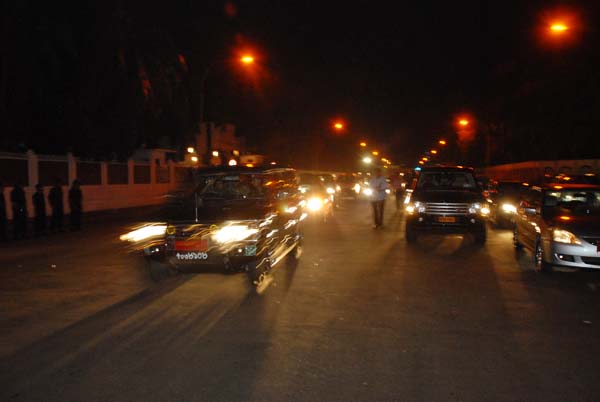
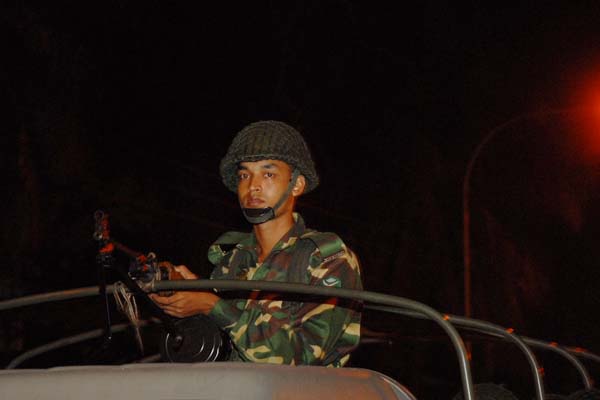
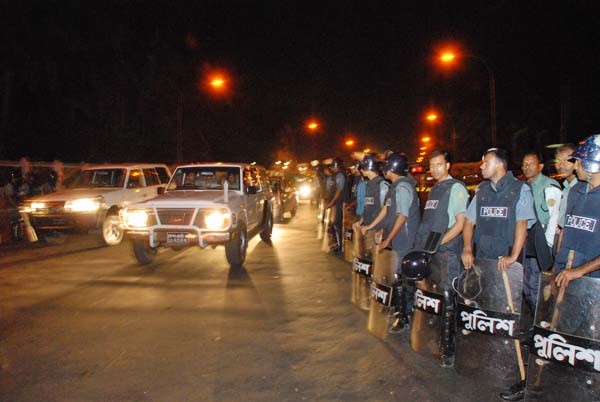
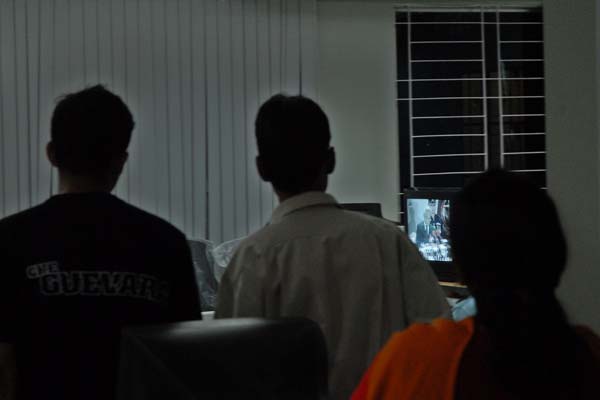
The Terrorist
Subscribe to ShahidulNews
![]()
The word “terrorist” was not in fashion in 1971. The Pakistanis called them “miscreants”. They called themselves the “Mukti Bahini” (freedom fighters). The ordinary Bangladeshi also called them “Muktis”, and therein lay their strength. They had limited resources, and very little training. They survived because the people risked their lives in giving them shelter, food, money, and a place to hide. They waved from the rooftops when the Mukti planes came to attack Dhaka. Trenches had been built, but they were too busy cheering to remember them, for in some ways, they too were Muktis.
Rejoicing in our independence, we quickly forgot those nine months, and treated the people in the Chittagong Hill Tracts much as the Pakistanis had treated us. The same oppression, the same genocide. The Bangladesh government called them “insurgents”. They called themselves the “Shanti Bahini”, (Peace Brigade), as did the other hill people. Shanti Bahini, years later, fought the Bangladeshi military junta, much as the Muktis had fought the Pakistanis, years before. Again the junta retaliated by killing the most vulnerable. It was the military that the people were terrified of. The Muktis and the Shanti Bahini were their saviours.
The main “terror” today is from the guns in the streets, the knee-capping, and the acid throwing. We call the people who do this, “shontrashis”. While the Muktis did strike terror in the hearts of the Pakistani soldiers, the goal was to liberate the people. The Shanti Bahini tried to defend their people from genocide. The shontrashis use terror to subjugate people into paying protection money, to gain control, to remove competition for government contracts, and to satisfy their lust. Protected by the politicians in power, the shontrashi and the junta are the only terrorists we have known.
Terror is not about danger itself, but about the fear of danger. Does the ordinary New Yorker, wake up in the morning expecting to die? The answer is no. Does the ordinary Afghani child lie sleepless at night in fear of the bombs from the sky and the ones lurking in the ground? The answer is a sad yes.
First published in ‘Banglarights” Bangladesh Human Rights Portal

